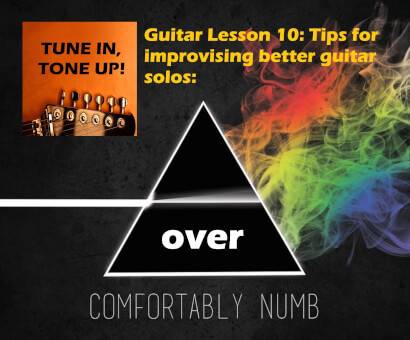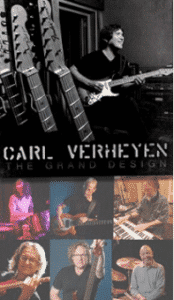Thoughts, advice and demonstrations on Guitar solo improvisation from tunein-toneup.com
Why do I love playing the guitar so much?
Mainly because the guitar is an instrument, a tool, which I use to express myself and hope to make the listener feel something. My voice. As Maya Angelou said:
People will forget what you said. People will forget what you did. But people will never forget how you made them feel.
I feel that this is easy to apply to this question and when you hear somebody playing music it makes you feel something before everything else. Music, as a universal language, transcends all barriers of understanding and is the quickest way to say and do something which elicits a feeling in another person. This connection is immediate and direct. The song is key and you can make someone feel something by virtue of the recognition of a song and the reliving of the feelings which they associate with that song, through its melody, rhythm, chord progression and primarily its lyrics. However, as you develop on your musical journey with your instrument you become aware of another way of using it creatively and in a more personal way – improvisation, soloing and the techniques and tonal harmonic understanding associated with this.

So, how to improvise better solos?
This was the subject of the most recent of our podcast episodes, which are recordings of my own guitar lessons with my teacher, Dan Davies. You can listen to the most recent episode here. Dan’s advice is really useful and I encourage you to have a listen and also to look at my further research on our own website . In this episode, my own playing becomes exposed and after hearing my efforts to solo over a ‘Comfortably Numb’ backing track, Dan makes some suggestions and draws out a few strengths. He picks up on some issues which I am having with technique including my rhythmic feel and the issue of bending using my little finger; he advises me to try using my stronger ring finger. He also asks questions about improvisation which I have begun to address here and we settle on the idea that we enjoy improvisation because it is a way to be heard. We wish to make our improvisation better because this increases our ability to be able to make someone feel something and it puts us honestly in the moment with nowhere to hide. That feeling of connection which you get with your instrument and the music you create becomes a ‘Holy Grail’ which you pursue and seek.
Here’s the backing track…..
And here’s Dan’s thematic playing over the top….
The tone, emotion, tempo, rhythm, genre and mood of the song are essential to take notice of in order to make your improvisation relevant and interesting. If you are trying to come up with something relevant for a Heavy Metal backing track, playing a solo with high gain and long bended notes like David Gilmour or Jeff Beck might, then the solo won’t fit. Equally, if you are playing over a Comfortably Numb backing track, lots of sweep picking, fast arpeggios and overdrive probably won’t communicate the mood and subject matter of the song adequately and again will most likely clash. It is worth spending some time trying to work on how to play to convey some different emotions and this experiment will be great fun too. Try to limit yourself to a few notes of the pentatonic scale and then investigate this fully by coming up with some short solos to elicit different emotions such as anger, sadness, happiness, excitement, wonder, laughter, etc. Hint – try using dynamics and volume as well as left and right hand techniques (e.g. into strings, bending or vibrato).
Improvisation becomes a central part of your practice as you develop, experimenting with the sound of notes over different chords and building up your techniques so that you can inject the things you have learnt into your playing. It is a skill and area of playing which is infinite as there are always new chord progressions with many different rhythms over which you can place your notes. It is a way to utilise scales, arpeggios and skill of tapping, sweep picking, bending or vibrato (to name but a few). Therefore, on your musical journey, improvisation becomes the way you explore and leave the well-trodden path of cover songs, tabs and copying others towards a wonderful understanding of harmony, melody and rhythm which in turn allows you to unleash your creativity.
I found some interesting quotes about improvisation, the Carl Verheyen ones were mentioned during this podcast episode (see link above):

Carl Verheyen: said that everything you learn is “money in the bank”, ready to withdraw it when you need it. He (taken from Chick Corea) said that
…even the very best of us are only truly improvising about 30% of the time. The rest of the time we are playing things we have already worked out…
This is great advice and should be a motivating factor when trying to nail good licks and techniques – after all, you will practise the things that you think sound good and it is encouraging to know that the more you practise those things, the more they will come out in your playing.
John McLaughlin said:

on a good night we play the things we know until we’re warmed up enough physically and mentally to play the things we don’t know.
This is another good piece of advice to keep in mind when performing. Allow yourself to warm up playing easier licks and ideas and bring the more challenging and on-the-spot creative things out when you have relaxed into your playing.
Themes:
Dan, in our lesson, finishes with an excellent idea to bear in mind if you, like me, are an aspiring improviser on the guitar. Often, when soloing over a backing track, the chord progression is a cyclic repetitive set of chords. This is really useful when improvising for a couple of reasons: First, you quickly get the progression into your head and so therefore begin to target the chord tones more easily. Second, you can improvise using ‘themes’, as Dan calls them, or certain ideas, phrasing or techniques and change the theme at the start of each round. Dan demonstrates this towards the end of our podcast episode when he has me call out the themes and he then performs a round aimed at it. You can hear this selection embedded into my website post and hear Dan’s great response to the themes I call out. This idea is really good because it will help you to avoid meandering aimlessly through a solo over a backing track (as Scott Henderson identifies many of us do) and will assist you in the moment to have some set ideas which you pre-plan to include in your improvised piece.

Leave a Reply